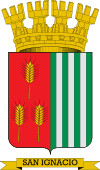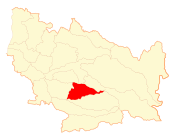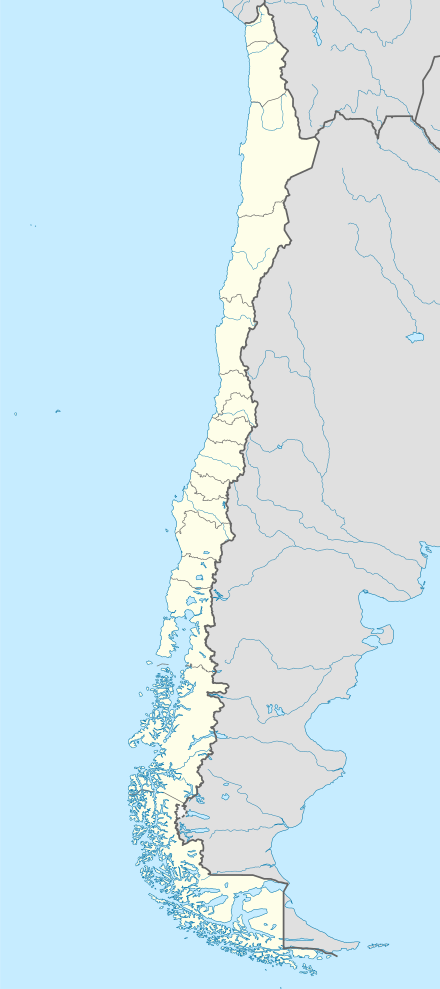San Ignacio, Chile
San Ignacio (Spanish pronunciation: [san iɣˈnasjo]) is a Chilean town and commune located in the Diguillín Province, Ñuble Region. It spans an area of 363.6 km2 (140 sq mi).[2]
San Ignacio | |
|---|---|
 Coat of arms | |
 Location of San Ignacio commune in the Ñuble Region | |
 San Ignacio Location in Chile | |
| Coordinates: 36°32′S 72°26′W | |
| Country | Chile |
| Region | Ñuble |
| Province | Diguillín |
| Government | |
| • Type | Municipality |
| • Alcalde | Nelson Aedo Figueroa (UDI) |
| Area | |
| • Total | 363.6 km2 (140.4 sq mi) |
| Elevation | 132 m (433 ft) |
| Population (2012 Census)[2] | |
| • Total | 15,566 |
| • Density | 43/km2 (110/sq mi) |
| • Urban | 4,873 |
| • Rural | 11,233 |
| Demonym(s) | Sanignacino |
| Sex | |
| • Men | 8,192 |
| • Women | 7,914 |
| Time zone | UTC-4 (CLT [3]) |
| • Summer (DST) | UTC-3 (CLST [4]) |
| Area code(s) | 56 + 42 |
Demographics
According to data from the 2002 Census of Population and Housing, San Ignacio had 16,106 inhabitants; of these, 4,873 (30.3%) lived in urban areas and 11,233 (69.7%) in rural areas. At that time, there were 8,192 men and 7,914 women.[2] Sanignacino is the demonym for a man, and Sanignacina is that of a woman.
Administration
As a commune, San Ignacio is a third-level administrative division of Chile administered by a municipal council, headed by an alcalde who is directly elected every four years. For the years 2008-2012, the alcalde is Nelson Aedo Figueroa (UDI), and the councilors are:[1]
- Osiel Soto Lagos (UDI)
- Juan Muñoz Pérez (UDI)
- Rolando Flores Monsalve (UDI)
- Mauricio López Muñoz (RN)
- Patricio Hernán Chávez Benavente (PDC)
- Romeo Valdés Guerra (PS)
Within the electoral divisions of Chile, San Ignacio is represented in the Chamber of Deputies as a part of the 41st electoral district (together with Chillán, Coihueco, Pinto, El Carmen, Pemuco, Yungay and Chillán Viejo). The commune is represented in the Senate
References
- "Government of Chile: SUBDERE - Alcaldes and Councilors" (in Spanish). Archived from the original on 6 June 2007. Retrieved 1 September 2010.
- "National Statistics Institute" (in Spanish). Retrieved 28 July 2010.
- "Chile Time". WorldTimeZones.org. Archived from the original on 2007-09-11. Retrieved 2010-07-28.
- "Chile Summer Time". WorldTimeZones.org. Archived from the original on 2007-09-11. Retrieved 2010-07-28.
